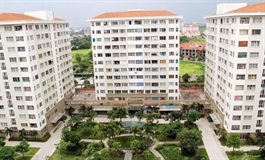Land assets failing to shift despite cuts
Land assets failing to shift despite cuts
The lack of related legal conditions, unclear information, and inappropriate prices are some of the problems that are rendering real estate units offered by banks unattractive to buyers.
Banks have been increasing their asset quality by provisioning and speeding up the handling of collateral to recover debts. Along with this, a series of houses, apartments, and other projects have been put up for sale.
In Thu Duc city, Agribank is selling four properties with a total area of nearly 1,800 square metres in Phu Huu ward, starting from $3 million. These are also villas owned by an individual but used as collateral for loans arising at Agribank Saigon Branch.
Sacombank is liquidating a series of real estate projects in districts 5, 10, 11, and 12, as well as in Binh Thanh district and Nha Be district of Ho Chi Minh City.
The most valuable asset among these is a land lot of 1,774sq.m in District 5, owned by an individual and used as collateral for a loan at the bank. However, due to the land buyer’s inability to pay the debt, Sacombank sold this debt to Vietnam Asset Management Company. Sacombank offers a starting price for this land lot of up to $23 million.
In Nha Be district, Sacombank is also selling a land plot and an attached factory with an area of nearly 60ha at Hiep Phuoc Industrial Zone (IZ). The land, for developing an IZ, has a starting price offered by Sacombank of $21.7 million.
And in June, Agribank offered six properties for sale in Da Kao ward in Ho Chi Minh City’s District 1 with a total area of nearly 2,000sq.m, starting at $12.2 million. These are all old villas with an area ranging from 290 to 360sq.m located on Tran Cao Van street.
Despite remarkably lowering the offered price many times during the past three years, two asset packages of Thuan Thao JSC in Tuy Hoa of the central province of Phu Yen remain unsold.
The first package includes the 5-star CenDeluxe Hotel, Thuan Thao Exhibition and Convention Centre with a total value of more than $21 million, and a Thuan Thao land plot worth $2.7 million. The second package is Thuan Thao Entertainment and Ecological Centre with a value of more than $5.1 million. The packages have been put up for auction 15 and 17 times respectively, but both remain unsold.
Explaining the reason why many projects could not be sold, Nguyen Van Dinh, vice president of the Vietnam Association for Realtors, said that liquidating assets is mostly not attractive for individual buyers. They meanwhile must think twice about the legal factors of such assets to avoid problems that may arise after the purchase. “In addition, many collateral assets were valued at higher prices than their actual value; therefore, when liquidating, banks often tend to set a price according to the value of the debt but not the market price,” Dinh said.
The demand for liquidated real estate is high, even for large-scale real estate projects, but in order to match the supply and demand, the property for sale needs to be ensured legally and conveniently in the transfer process. The most important factor is to evaluate the asset at the right price, according to Dinh.
According to a statement released in September by Vietcombank Securities, the quiet business and strong price fluctuations of the real estate market recently may negatively affect bad debt recovery activities of banks as real estate is the main collateral for loans.
However, the extension of Resolution No.42/2017/QH14 from August 15 until the end of 2023 is a good signal to help banks speed up the process of handling outstanding bad debts and maintain a bad debt ratio on the balance sheet below 2 per cent.
Huynh Phuoc Nghia, an economist from the Ho Chi Minh City University of Economics, said that bad debts related to real estate always existed in the banking system and the process of dealing with bad debts of banks is taking time.
“It is not too risky for banks when they hold collateral as real estate and when selling it, there may be difficulties but the damage is not great,” Nghia said.
Banks have evaluated the assets’ value according to their technique but not depending on the market price. Therefore, if there is a need to liquidate assets, it is still under control.
“It is possible that some banks will have temporary difficulties in selling certain projects, but it is not a big problem because real estate in Vietnam is less depreciated. The problem is just fast or slow processing,” Nghia added.



























